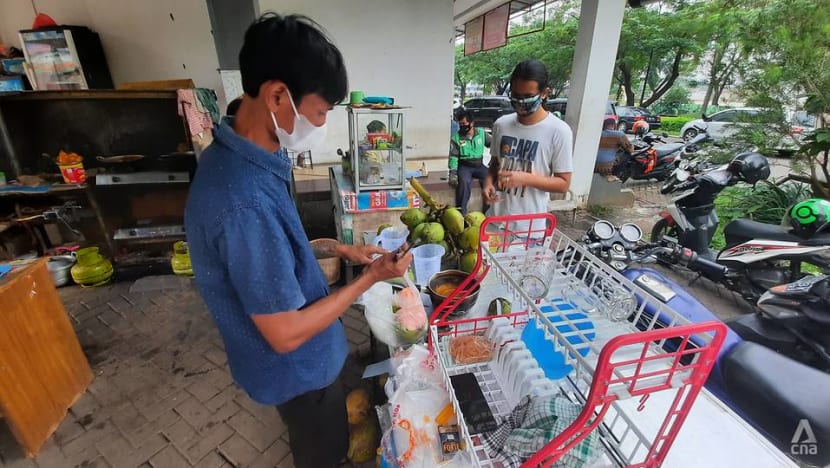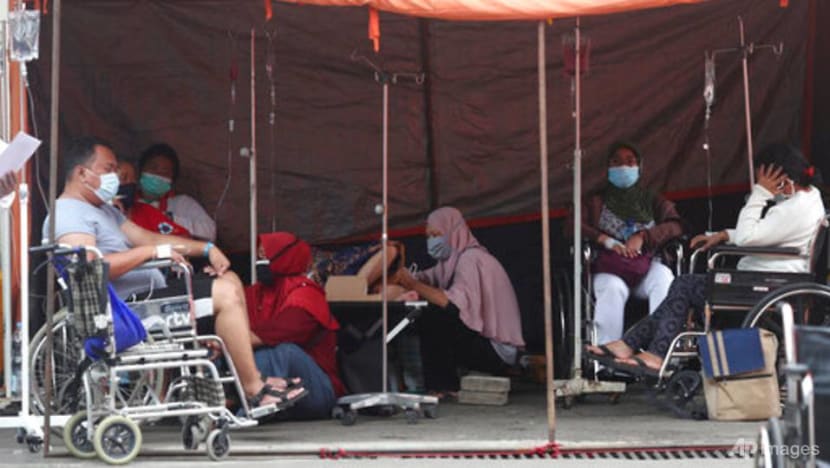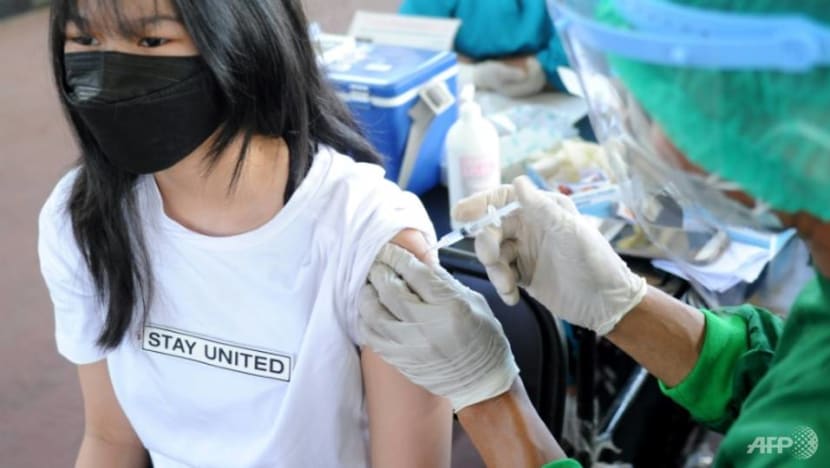Indonesians turn to healthy drinks and food as COVID-19 rages, but authorities warn of overconsumption

A man buying green coconut at a food stall in Jakarta, Indonesia. As COVID-19 cases spiked recently, Indonesians have been stockpiling on healthy drinks and foods, causing prices to soar. (Photo: Nivell Rayda)
JAKARTA: From sterilised milk to green coconuts, Indonesians have been stocking up on healthy drinks, foods and spices as the COVID-19 caseload rose sharply.
Messages claiming that these are effective in preventing and treating COVID-19 have proliferated on text messaging platforms and social media, resulting in high demand and soaring prices for some of them.
Experts interviewed by CNA have expressed concern over the potential side effects of overconsuming these food and drinks, as well as people possibly becoming complacent in observing health protocols as they believe that they are protected.
“People have been getting the wrong information about these goods with some claiming that they can cure COVID-19 or at least prevent people from getting infected or remedy some symptoms,” Dr Siti Nadia Tarmizi, the Indonesian Health Ministry’s Director for Infectious Disease Prevention and Control told CNA.
“There have been no clinical trials showing that they are effective in preventing let alone curing COVID-19.”
Mdm Tarmizi said the Health Ministry has repeatedly warned the public against hoarding these goods, but it appears that the message had fallen on deaf ears for some people.
SURGE IN DEMAND
Over the past few weeks, several videos showing Indonesians jostling with each other to stock up on a particular brand of cow milk went viral.
The phenomenon appeared to have resulted from unverified information that the particular brand of sterilised milk could boost antibodies, which will in turn prevent COVID-19 infection.
With the sudden surge in demand, some resellers were said to have marked up prices by up to five times.
“It is hard to get my hands on the Bear Brand milk these days, which is why I tried to buy some, every chance I get,” housewife Merry Sihombing told CNA.
“I am told that the milk is good for you. I am not quite convinced that it will stop my family from contracting COVID-19 but there is no harm in taking extra precaution.”
The milk’s producer Nestle has since assured the public that there is no need to stockpile the product and promised to ensure continuous supply to keep prices steady.
Currently, retail price for the milk has stabilised at around 12,000 rupiah (US$0.83) per can. Before, it sold for around 9,000 rupiah.
READ: Volunteer ambulance drivers help take the strain on Indonesia's COVID frontline
READ: Concern grows over Indonesia's regions as Delta COVID-19 variant ravages Java
The same occurred with green coconut, a shell-less, meatless variety of the fruit.
“Since last week, people have been buying green coconut, sometimes four or five at the same time,” coconut seller Jarot, who like many Indonesians goes with one name, told CNA.
“It’s hard to find green coconuts at wholesalers or at the market. I have searched everywhere and all I can get are a few small ones barely bigger than my fist. It is in such high demand that coconut farm owners are harvesting the fruit before it is fully grown. Even then, people buy them.”
Mr Jarot said he normally sells fully grown green coconuts for 12,000 rupiah each. Today, they can fetch 30,000 rupiah each. “Even the small ones go for 15,000 each,” he said.

Sterilised milk and green coconuts may just be the tip of the iceberg. On social media and various messaging apps, there have been other messages touting an array of goods as COVID-19 treatments, with little to no scientific research to back up their claims.
“Some viral messages even went so far as saying that there is no need to go to the doctors if one has tested positive for COVID-19. (They say that) one can be cured simply by consuming raw garlic or honey or Indian costus,” housewife Nancy Suwandono told CNA.
“I am sceptical (of these claims). But at the same time, I don’t want to see their prices go up and find myself unable to obtain them.” She has bought four different brands of honey and a bottle of Indian costus.
GROWING DESPERATION
What drives such behaviour?
Dr Hermawan Saputra of the Indonesian Public Health Expert Association (IAKMI) said people are becoming more and more desperate to protect themselves.
“The pandemic has been raging for a year and a half, and people are seeing COVID-19 cases spiking out of control. (The) healthcare system is overwhelmed and there is no sign the pandemic will be over,” the IAKMI advisor told CNA.
“At this stage, more and more people feel they need to protect themselves and their families. Unfortunately for some, this meant that they will believe in anything.”

Dr Pandu Riono, an epidemiologist from University of Indonesia said although these goods do have nutritional values, they are easily replaced by other foods.
“Stockpiling them is pointless,” he told CNA. “The best way to protect oneself from contracting COVID-19 is to obey health protocols, wear masks, avoid crowds and wash hands regularly.”
OVERCONSUMPTION CAN POSE RISKS: HEALTH MINISTRY
Health Ministry director Mdm Tarmizi said with the goods in such high demand, there is a risk of overconsuming them.
“Some of these goods do have some nutritional values which can boost immunity. However, overly consuming them can have side effects,” she said.
According to medical journals, drinking too much milk can cause various digestive issues. Meanwhile, consuming coconuts in large amount can cause potassium levels in the blood to become too high which might lead to kidney problems, studies have shown.
READ: What might have caused the huge spike in Indonesia's COVID-19 cases post-Idul Fitri holiday
Mdm Tarmizi said all foods and drinks, no matter how nutritious and beneficial to health, should be consumed in moderation.
“We don’t want people to pile up these foods and drinks and at the end of the day overly consuming them,” she said.
The Health Ministry director said there is also a risk that people will become complacent after consuming these goods.
“These foods and drinks do not replace the two main ways to prevent COVID-19 infection which are obey strict health protocols and vaccination,” she said.

“The government will continue to advocate against people overly consuming supplements and certain types of foods and drinks. Just buy what we need.”
Indonesia has recorded 2.7 million COVID-19 cases since the pandemic began. Of this number, around 290,000 people tested positive over the last one week. Between 800 to 1,000 people died because of the pandemic in the last seven days, bringing the country's death toll to more than 70,000.














